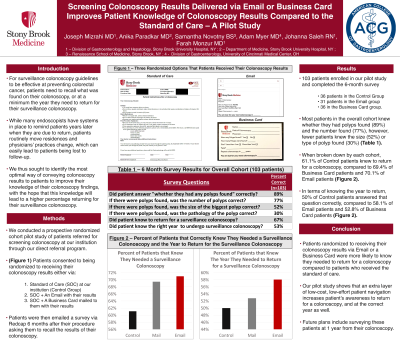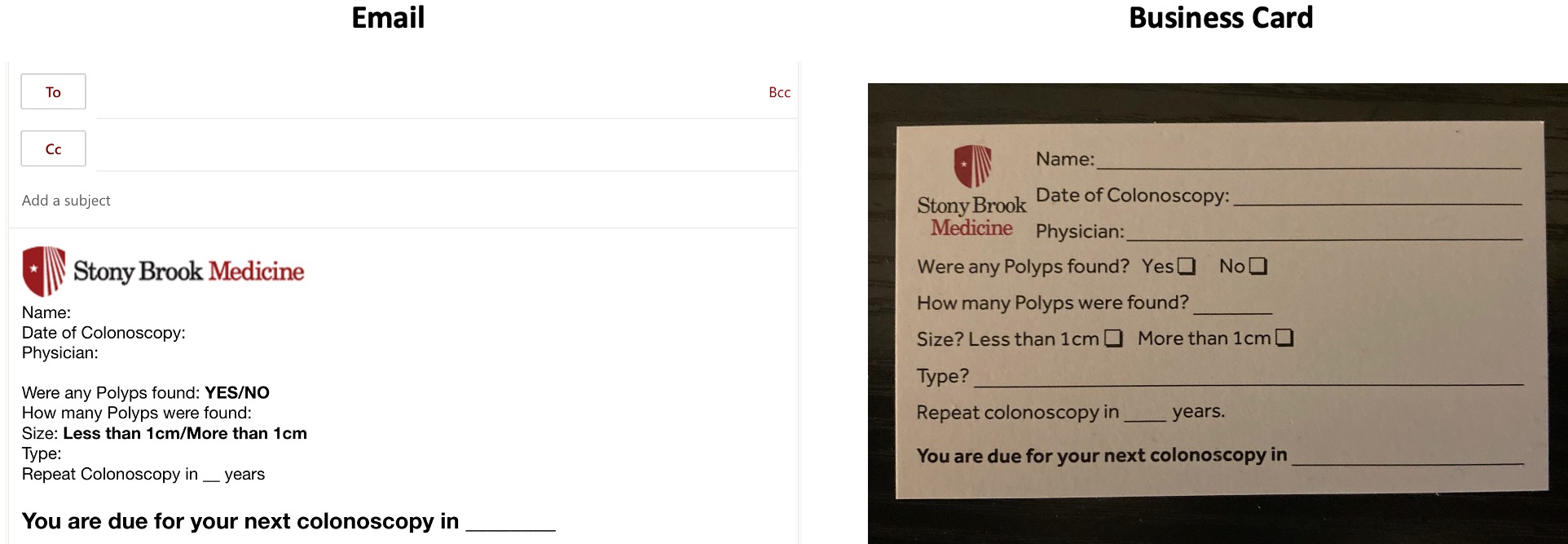Back

Poster Session D - Tuesday Morning
Category: Practice Management
D0627 - Screening Colonoscopy Results Delivered via Email or Business Card Improves Patient Knowledge of Colonoscopy Results Compared to the Standard of Care
Tuesday, October 25, 2022
10:00 AM – 12:00 PM ET
Location: Crown Ballroom


Joseph Mizrahi, MD
Stony Brook University Hospital
Stony Brook, NY
Presenting Author(s)
Joseph Mizrahi, MD1, Anika Paradkar, MD1, Samantha Novotny, BS2, Adam Myer, MD1, Johanna Saleh, RN1, Farah Monzur, MD1
1Stony Brook University Hospital, Stony Brook, NY; 2Renaissance School of Medicine at Stony Brook University, Stony Brook, NY
Introduction: For surveillance colonoscopy guidelines to be effective at preventing colorectal cancer, patients need to recall what was found on their colonoscopy, or at a minimum the year they need to return for their surveillance colonoscopy. While many endoscopists have systems in place to remind patients years later when they are due to return, patients routinely move residences and physicians’ practices change, which can easily lead to patients being lost to follow-up. Thus, we sought to identify the most optimal way of conveying colonoscopy results to patients to improve their knowledge of their colonoscopy findings.
Methods: We conducted a prospective randomized cohort pilot study of patients referred for screening colonoscopy at our institution through our direct referral program. Patients consented to being randomized to receiving their colonoscopy results either via the Standard of Care at our institution (Control Group), an Email with their results, or a Business Card mailed to them with their results (Figure 1). Patients were then emailed a survey 6 months after their procedure asking them various questions about their colonoscopy.
Results: 103 patients enrolled in our pilot study and completed the 6-month survey, with 36 patients in the Control Group, 31 patients in the Email group, and 36 in the Business Card group. Overall, 67% of patients knew they needed to return for a surveillance colonoscopy, with 53.4% of patients knowing the exact year to return. When broken down by each cohort, 61.1% of Control patients knew to return for a colonoscopy, compared to 70.1% of Email patients and 69.4% of Business Card patients. In terms of knowing the year to return, 50% of Control patients answered that question correctly, compared to 58.1% of Email patients and 52.8% of Business Card patients.
Discussion: Overall, patients randomized to receiving their colonoscopy results via Email or a Business Card were more likely to both know that they needed to return for a colonoscopy as well as the specific year to return, compared to patients who received the standard of care. Our pilot study shows that an extra layer of low-cost, low-effort patient navigation increases patient’s awareness to return for a colonoscopy, and at the correct year as well. Future plans include surveying these patients at 1 year from their colonoscopy, as well as ultimately seeing if these interventions impact a patient’s likelihood of undergoing a surveillance colonoscopy.

Disclosures:
Joseph Mizrahi, MD1, Anika Paradkar, MD1, Samantha Novotny, BS2, Adam Myer, MD1, Johanna Saleh, RN1, Farah Monzur, MD1. D0627 - Screening Colonoscopy Results Delivered via Email or Business Card Improves Patient Knowledge of Colonoscopy Results Compared to the Standard of Care, ACG 2022 Annual Scientific Meeting Abstracts. Charlotte, NC: American College of Gastroenterology.
1Stony Brook University Hospital, Stony Brook, NY; 2Renaissance School of Medicine at Stony Brook University, Stony Brook, NY
Introduction: For surveillance colonoscopy guidelines to be effective at preventing colorectal cancer, patients need to recall what was found on their colonoscopy, or at a minimum the year they need to return for their surveillance colonoscopy. While many endoscopists have systems in place to remind patients years later when they are due to return, patients routinely move residences and physicians’ practices change, which can easily lead to patients being lost to follow-up. Thus, we sought to identify the most optimal way of conveying colonoscopy results to patients to improve their knowledge of their colonoscopy findings.
Methods: We conducted a prospective randomized cohort pilot study of patients referred for screening colonoscopy at our institution through our direct referral program. Patients consented to being randomized to receiving their colonoscopy results either via the Standard of Care at our institution (Control Group), an Email with their results, or a Business Card mailed to them with their results (Figure 1). Patients were then emailed a survey 6 months after their procedure asking them various questions about their colonoscopy.
Results: 103 patients enrolled in our pilot study and completed the 6-month survey, with 36 patients in the Control Group, 31 patients in the Email group, and 36 in the Business Card group. Overall, 67% of patients knew they needed to return for a surveillance colonoscopy, with 53.4% of patients knowing the exact year to return. When broken down by each cohort, 61.1% of Control patients knew to return for a colonoscopy, compared to 70.1% of Email patients and 69.4% of Business Card patients. In terms of knowing the year to return, 50% of Control patients answered that question correctly, compared to 58.1% of Email patients and 52.8% of Business Card patients.
Discussion: Overall, patients randomized to receiving their colonoscopy results via Email or a Business Card were more likely to both know that they needed to return for a colonoscopy as well as the specific year to return, compared to patients who received the standard of care. Our pilot study shows that an extra layer of low-cost, low-effort patient navigation increases patient’s awareness to return for a colonoscopy, and at the correct year as well. Future plans include surveying these patients at 1 year from their colonoscopy, as well as ultimately seeing if these interventions impact a patient’s likelihood of undergoing a surveillance colonoscopy.

Figure: Figure 1 - Examples of the Email and Business Card that were sent to patients
Disclosures:
Joseph Mizrahi indicated no relevant financial relationships.
Anika Paradkar indicated no relevant financial relationships.
Samantha Novotny: Pfizer – Stock-publicly held company(excluding mutual/index funds).
Adam Myer indicated no relevant financial relationships.
Johanna Saleh indicated no relevant financial relationships.
Farah Monzur: Medtronic (Covidien) – Consultant.
Joseph Mizrahi, MD1, Anika Paradkar, MD1, Samantha Novotny, BS2, Adam Myer, MD1, Johanna Saleh, RN1, Farah Monzur, MD1. D0627 - Screening Colonoscopy Results Delivered via Email or Business Card Improves Patient Knowledge of Colonoscopy Results Compared to the Standard of Care, ACG 2022 Annual Scientific Meeting Abstracts. Charlotte, NC: American College of Gastroenterology.
